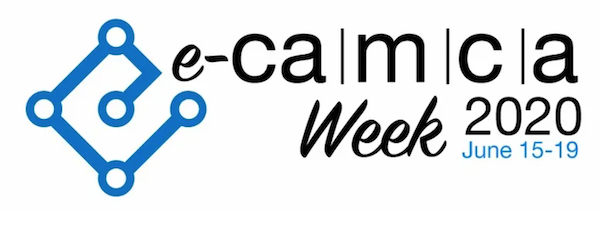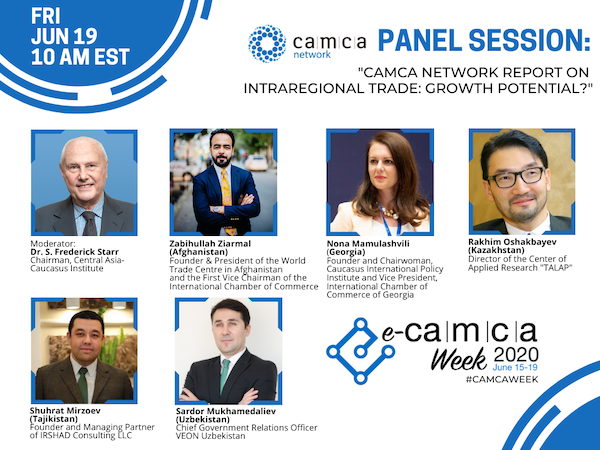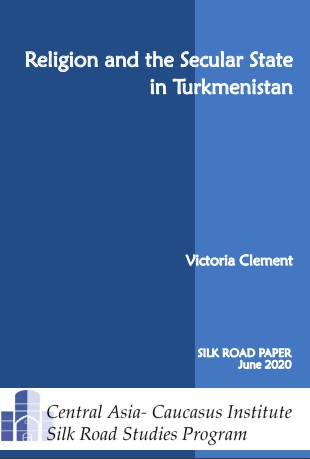CACI and the Rumsfeld Foundation hosted e-CAMCA Week 2020
In lieu of our in-person annual gathering, the CAMCA Regional Forum organizers are hosting a virtual e-CAMCA Week.
The June 2020 CAMCA Forum, to be held in Almaty, Kazakhstan, was postponed until June 2021. In its place, CACI and the Rumsfeld Foundation organized the e-CAMCA week of online events and publication. Find recordings of the e-CAMCA Week virtual events held over June 15th-19th at the CAMCA Forum YouTube Channel, as well a variety of original #CAMCAweek publications and resources for our CAMCA Forum community at www.camcaforum.org,.

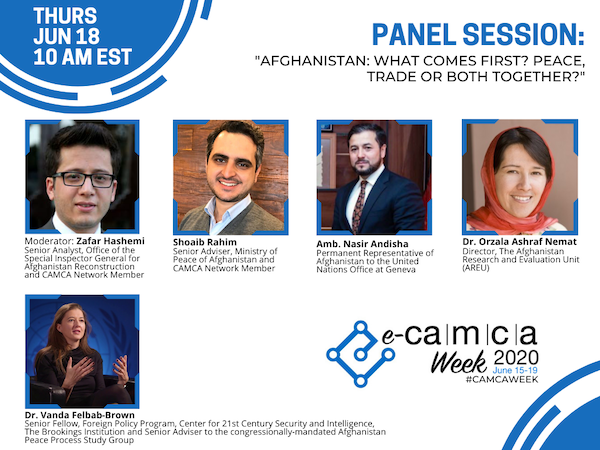
E-CAMCA WEEK PUBLICATIONS
Welcome Letter
Letter from Secretary Donald Rumsfeld
e-CAMCA Week 2020 participants
Meet CAMCA Entrepreneurs
View features of some successful regional entrepreneurs from our CAMCA Network
"Caucasus & Central Asia Post COVID-19" Series- Volume I
Digital Transformation in the CAMCA Region
Post COVID-19: Challeges & Opportunities for the Region
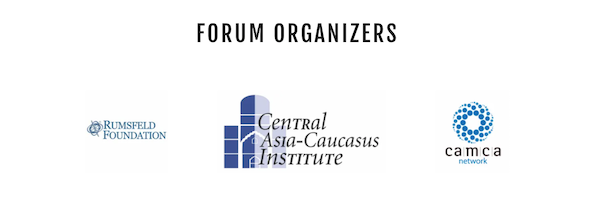
CACI releases Silk Road Papers on State and Religion in Kyrgyzstan and Turkmenistan
Religion and the Secular State in Central Asia: The Examples of Kyrgyzstan and Turkmenistan

This event marked the publication of two Silk Road Papers on the state-religion relationships in Central Asia, a study of Kyrgyzstan by Johan Engvall and one on Turkmenistan by Victoria Clement. This forms part of the ongoing research effort on secular governance, religion and politics at the Central Asia-Caucasus Institute & Silk Road Studies Program Joint Center, and follows the publication of studies on Azerbaijan, Kazakhstan and Uzbekistan.
Johan Engvall’s study of Kyrgyzstan’s experience is timely given that country’s experience, starting with a more permissive atmosphere that subsequently aligned itself with policies in the rest of the region. Victoria Clement’s study of Turkmenistan is the first treatment of the subject to appear in print, and sheds light on the similarities of Turkmenistan’s approach with the rest of Central Asia as well as its specificities.
Speakers:
Victoria Clement, Eurasia Regional Analyst, Center For Advanced Operational Culture Learning, Marine Corps University
Johan Engvall, Senior Research Fellow, Foreign Policy Research Institute
Moderator: Svante E. Cornell, Director, Central Asia-Caucasus Institute at AFPC
When: Monday, June 15, 2020 at 10am EDT
The Event was live-streamed on our Facebook page and is available on our YouTube page and here.
e-CAMCA Week 2020
In lieu of our in-person annual gathering, the CAMCA Regional Forum organizers are hosting a virtual e-CAMCA Week.
From June 15th-19th we will be hosting a daily live speaker session or panel, as well as releasing a variety of original content and helpful resources, for our CAMCA Forum community. We’ve pulled together a terrific collection of experts from across sectors, including members of the CAMCA Network, that will be delivering the latest on what you need to know about the region during the COVID-19 crisis and beyond.
Live video events will take place at 10 AM EST daily from June 16th-19th .
TUNE IN HERE to our Facebook page for live video events (full agenda below) and
SUBSCRIBE BELOW to receive the aforementioned release
VIEW THE FULL AGENDA DETAILS HERE


E-CAMCA WEEK PUBLICATIONS
Welcome Letter
Letter from Secretary Donald Rumsfeld
e-CAMCA Week 2020 participants
Meet CAMCA Entrepreneurs
View features of some successful regional entrepreneurs from our CAMCA Network
"Caucasus & Central Asia Post COVID-19" Series- Volume I
Digital Transformation in the CAMCA Region
Post COVID-19: Challeges & Opportunities for the Region

Religion and the Secular State in Turkmenistan
Central Asia-Caucasus Institute & Silk Road Studies Program
Silk Road Paper
June 2020
Since gaining its independence from the Soviet Union in 1991, Turkmenistan has seen an increased presence of religion in everyday life. Islam has been a continuous cornerstone of Turkmen identity for centuries and is even more so in the post-Soviet period. Turkmeniçilik (Turkmen identity) and Musulmançilik (Muslim identity) are correlated.
Similar to what is found in several Central Asian countries, Turkmenistan distinguishes between traditional and non-traditional religious practices. In Turkmenistan, the state actively privileges a form of traditional Islam. That is, the leadership mobilizes the faith in its construction of a post-Soviet, national Turkmen identity. Yet, Turkmenistan is an officially secular country with constitutional provisions for the separation of state from religion. What does this mean for religious practice in that Muslim-majority country? What is the role of the state in mobilizing religious practices even as it curtails others? And why are there so few external influences on worship in Turkmenistan?
Turkmen were historically a nomadic people that began to adopt Islam as they migrated westward in the 9th and 10th centuries. Yet Islam is a religion that has tended to flourish in urbanized societies that could establish formal institutions like mosques and madrasas. Turkmen created intensive and rich religious practices, but those were often mixed with pre-Islamic practices or honed to suit the nomadic lifestyle. Nevertheless, this did not diminish the importance of religion in Turkmen culture and Islam came to be a key marker of Turkmen identity.
Today, that culture, including Islam as a key facet, contributes to the Turkmen national identity. The state encourages the conceptualization of “Turkmen Islam,” or worship infused with veneration of elders and saints, life-cycle rituals, and Sufi practices. Yet, it discourages external influences in most spheres of life, resulting in a limited foreign religious presence. TheConstitution’s claims to uphold a secular system in which religious and state institutions are separate. Nevertheless, examples of state interference in religious matters abound.
While Turkmenistan’s initial years of independence saw an increase in religious practices and the development of institutions like the Muftiate and the building of mosques, today it is more regulated. Still, the government leadership uses Islam to legitimize its role by sponsoring holiday celebrations such as iftar dinners during Ramadan or presidential pilgrimage to Mecca, Saudi Arabia. This sponsorship has validated the country’s two presidents (Nyýazow and Berdimuhamedow) as pious Turkmen, giving them an aura of cultural authority. In these ways, the government promotes a singular form of “Turkmen Islam” that is tightly bound to national identity and makes use of religious symbols to reinforce the concept of the nation-state.
In light of this, this study aims to shed light on the relationship between state, religion, and society in Turkmenistan, highlighting the model of secular governance the state observes even as it embraces Islam as part of national identity project.
[Video Posted] CACI Online Forum: Religion and the Secular State in Central Asia: The Examples of Kyrgyzstan and Turkmenistan
Religion and the Secular State in Central Asia: The Examples of Kyrgyzstan and Turkmenistan
This event marks the publication of two Silk Road Papers on the state-religion relationships in Central Asia, a study of Kyrgyzstan by Johan Engvall and one on Turkmenistan by Victoria Clement. This forms part of the ongoing research effort on secular governance, religion and politics at the Central Asia-Caucasus Institute & Silk Road Studies Program Joint Center, and follows the publication of studies on Azerbaijan, Kazakhstan and Uzbekistan.
Johan Engvall’s study of Kyrgyzstan’s experience is timely given that country’s experience, starting with a more permissive atmosphere that subsequently aligned itself with policies in the rest of the region. Victoria Clement’s study of Turkmenistan is the first treatment of the subject to appear in print, and sheds light on the similarities of Turkmenistan’s approach with the rest of Central Asia as well as its specificities.
Speakers:
Victoria Clement, Eurasia Regional Analyst, Center For Advanced Operational Culture Learning, Marine Corps University
Johan Engvall, Senior Research Fellow, Foreign Policy Research Institute
Moderator: Svante E. Cornell, Director, Central Asia-Caucasus Institute at AFPC
When: Monday, June 15, 2020 at 10am EDT
The event was live-streamed on our Facebook page and is now available on Youtube.
